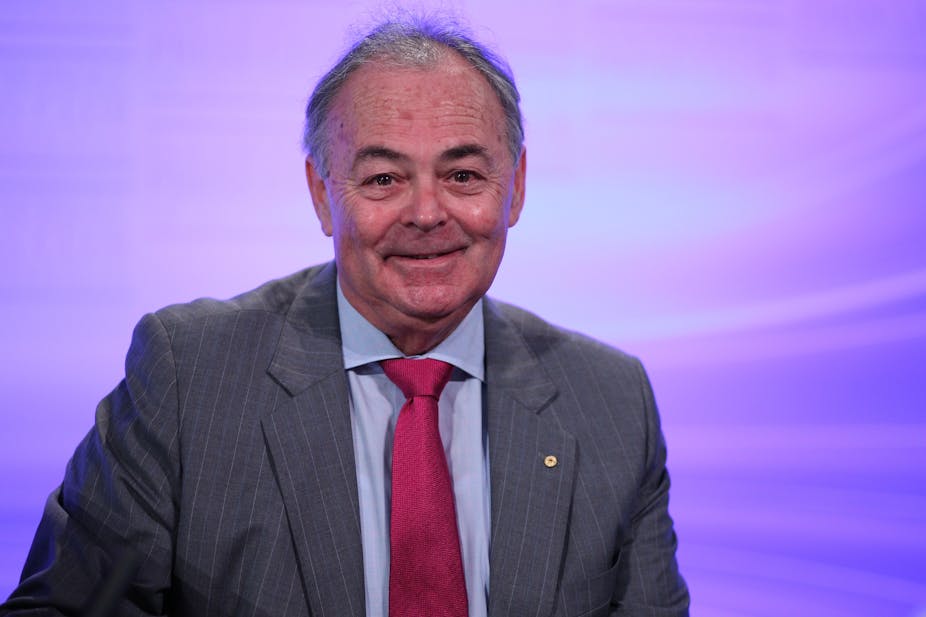ABC chairman Jim Spigelman has strongly defended the national broadcaster against political attacks and complaints about its competing online with commercial media.
Spigelman said there was nothing new in the ABC competing. “Nor are the complaints. Nor is the attempt to exercise political influence to restrict us.”
Addressing the National Press Club, he said the ABC had never been just a “market failure” broadcaster and also pointed out that its charter had been amended this year to add “digital media services” as a core statutory function.
Spigelman’s comments follow calls by some government MPs, especially conservative senator Cory Bernardi, to have the ABC vacate the online area or be forced to put it on a commercial basis. Some critics believe the ABC or part of it should be privatised.
News Corp, especially through The Australian, has been highly critical of the ABC competing with newspapers and their online operations.
Spigelman pointed out that in the early 1930s, when the ABC first announced it was intending to provide a news service, a campaign was launched to cut its funding. That campaign was run by the then CEO of the Herald and Weekly Times, Keith Murdoch, father of Rupert Murdoch.
Spigelman is clearly nervous that the ABC’s funding will be hit by general cuts in next week’s midyear budget update, though he said he knew of no cuts that were specific to the broadcaster. A specific cut would break an undertaken given by Tony Abbott before the election.
In what appears a gesture to recent criticism, Spigelman announced that the board has decided that the ABC will produce and publish a series of “editorial audits” on particular program topics, by people of relevant experience not employed by the ABC.
The first audit was well advanced, he said. It was being prepared by Andrea Wills, a British journalist with experience at both the BBC and the ABC.
It would assess the impartiality of all the interviews on ABC radio of then Prime Minister Kevin Rudd and then opposition leader Abbott during the election campaign. A second audit would consider the treatment of the debate about asylum seekers.
Spigelman said that since his appointment he had “naturally been concerned with the frequency of allegations of lack of impartiality”. This was not systematic, but did sometimes occur.
The bias allegations were more often a function of topics chosen than content. Journalists “tend to have a social and educational background, perhaps particularly in Canberra, Sydney and Melbourne, that may make them more interested in, say, gay marriage than, say, electricity prices. As a public broadcaster we must endeavour to engage with those sections of our community who are concerned with the latter”.
The ABC next year would undertake detailed work with a leading research team to give more systematic briefings to staff on the issues important to all Australians. “We are seeking far deeper insights … on the thinking of Australians and to place the results in the hands of the full range of our editorial decision makers. We hope to enhance our understanding of our audiences and speak to the things important in their lives.”
Asked about the controversial decision of the ABC to partner with Guardian Australia to run the revelation about Australian spying on the Indonesian President and other important figures, Spigelman said he had no doubt this was “within the reasonable grounds of professional journalism”.
He said he had once had a very high security clearance and so had a very real understanding of the significance of intelligence. He did not doubt the enormous damage that the material from Edward Snowden, on which the story was based, had done to western intelligence agencies.
“Nevertheless publication of the material is a different matter. As far as the ABC decision was concerned, it was clearly done in a context where this was going to be published anyway,” he said.
“The ABC decision, in terms of what the public interest involved, was a reasonable decision, but that context is really important. It was going to be published anyway.”
He also said that one thing that bothered him about our relations with Indonesia was the failure of most Australians to recognise just how vibrant Indonesian democracy was. Indonesia had a vibrant local media and the amplification in their media would have happened without the ABC.

